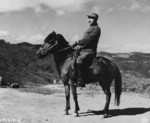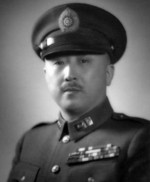Wei Lihuang
| Surname | Wei |
| Given Name | Lihuang |
| Born | 16 Feb 1897 |
| Died | 17 Jan 1960 |
| Country | China |
| Category | Military-Ground |
| Gender | Male |
Contributor: C. Peter Chen
ww2dbaseWei Lihuang was born to Wei Zhengqiu, a local official, in Hefei, Anhui Province, Qing Dynasty China in 1897. His father passed away from disease in 1905. He enlisted in the local military at Hezhou (now He County) in Anhui Province in 1912. In 1913, he saw action during the Second Revolution in which Anhui, among other provinces, rebelled against Yuan Shikai's Beiyang government; when the rebellion was put down, he returned to his home village. In early 1914, he studied at a military academy in Hubei Province, China; refusing to join the Beiyang military like most of his classmates, he went to Shanghai, China. In 1915, he was involved in the failed anti-Beiyang action involving the protected cruiser Zhaohe. In 1916, he joined the Guangdong Province military. In Sep 1917, Dr. Sun Yatsen established his government in Guangdong Province, and thus Wei became involved with the Nationalist Party. Shortly after, he was chosen to join Sun's bodyguard unit as a platoon leader. In Apr 1918, during the Beiyang invasion of Guangdong, he was reassigned to a front line detachment, during which he led the survivors of a battle-scattered unit in a successful counterattack; for this action he was promoted to the rank of company commander. In the first half of the 1920s, he saw action in Guangxi, Jiangxi, Fujian, and other locations as the Nationalists secured their position in southern China. By 1925, he commanded at the regiment and brigade levels. He participated in the 1926-1927 Northern Expedition; his successes led to his appointment as the commanding officer of the 14th Division. In Oct 1927, he was given the concurrent duty as the deputy commander of the 9th Army. In 1928, he enrolled in the Beiping War College. In early 1930, he was made the commanding officer of the 45th Division; in this role, he guarded the capital of Nanjing during the Central Plains War. In 1931, he was made the commanding officer of the 14th Army. In Sep 1932, upon the successful conquest of Jinzhai County, Anhui from communist forces, Nationalist Chiang Kaishek renamed the county to Lihuang in his honor (the name would remain until communist re-capture in Sep 1947). Between Nov 1933 and Feb 1934, he successfully struck down communist forces during the Fujian Incident. In 1935, he was made a member of the Central Executive Committee of the Nationalist Party. In Sep 1936, he was promoted to the rank of General First Class. In Dec 1936, he was interned alongside of Chiang during the Xi'an Incident.
ww2dbaseWhen WW2 began in 1937, Wei was initially made the deputy commander of the 2nd War Area (Shanxi and Chahar Provinces) with direct command over the 14th Army Group. Between Sep and Nov 1937, he played a direct role in the Battle of Xinkou in Shanxi Province. Despite his past reputation for having repeatedly defeated communists forces, as the commanding officer of the 2nd War Area which had a communist component, ie. 8th Route Army, he was known for overlooking politics in order to deliver ammunition and supplies to the 8th Route Army, something his peers would often refuse to do. In Sep 1939, he was made the Chairman of the Henan Province while assuming the role as the commanding officer of the 1st War Area (Henan and Anhui Provinces). In his role, he had a close working relationship with communist leader Zhou Enlai; this turned some heads within Nationalist leadership, and his loyalty began to be questioned. In Sep 1940, commanded the successful re-capture of Zhengzhou, Henan Province, an important railroad junction town, from the front. In late 1941, he was transferred to Xi'an without being given a new military command because his close working relationship with the communists became too suspicious for Chiang. In Mar 1942, the Chinese Expeditionary Force was formed; it was said that he was the intended commanding officer for this unit, but his communist connections meant that the job would go to Luo Zhuoying instead. He was finally given another chance in Apr 1944 when Chen Cheng, the current commander of the Chinese Expeditionary Force, fell ill. As the new commander, he successfully attacked and pushed back lines held by the Japanese 56th Division in southern China and northern Burma, in coordination with Joseph Stilwell's offensive on the opposite side of of the Japanese division, thus opening open the Burma Road supply route in early 1945. He was known to the Americans as a capable general who, unlike some of his peers, was friendly to westerners. In May 1945, he was made the deputy commanding officer of the Chinese Army, with his headquarters established in Kunming, Yunnan Province, China.
ww2dbaseAfter the war, the Nationalist-Communist civil war resumed. In Nov 1946, Wei was dispatched to the United States for six months. At the end of that assignment, he was sent on similiar inspection duties to Britain, France, West Germany, Switzerland, the Netherlands, and Belgium; this assignment abroad was favorable to both Chiang as well as Wei, the former was uncertain of of the latter's political leanings, and the latter wished to avoid confrontation with his war-time communist comrades in the renewed civil war. In the fall of 1947, demands for officers led to Chiang naming Wei as the commanding officer of the Northeast Anti-Communist Headquarters, a force with a strength of four army groups headquartered in Mukden (Shenyang), Liaoning Province, China. He dug in near Mukden, Jinzhou, and Changchun against Chiang's direct orders to launch an offensive. In Sep 1948, frustrated Chiang called for a meeting with Wei in Nanjing, reasserting his order for Wei to launch an offensive out of Mukden toward Jinzhou, which by then had been surrounded; Gu Zhutong, loyal to Chiang, was assigned as Wei's new chief of staff to ensure Wei followed his orders. On 3 Oct 1948, still refusing his orders, he was dismissed, in person, by Chiang; Du Yuming succeeded Wei at the Northeast Anti-Communist Headquarters. By then, the situation could no longer be reversed; Jinzhou fell under communist control on 14 Oct, and Mukden followed suit on 2 Nov. Wei was evacuated out of Mukden by air on 30 Oct 1948 aboard an aircraft dispatched by Chiang. He was placed in house arrest in Beiping for disobeying his orders until mid-Nov when he attempted to escape to Hong Kong with his family; he was caught in Guangzhou and was transported to Nanjing. In Jan 1949, he was pardoned by Acting President Li Zongren. He relocated to Hong Kong and engaged in several businesses, ultimately resulting in bankruptcy in the mid-1950s. After a period of negotiations with his acquaintances in Beijing, he defected to the communists in Mar 1955. With the communists, he served as the Vice Chairman of the National Defense Committee, member of the 2nd and 3rd National Committee of the Chinese People's Political Consultative Conference, a representative of the People's Congress, and others. He passed away in communist China in 1960. He was buried at the Babaoshan Revolutionary Cemetery in Beijing.
ww2dbaseSources:
Baidu Baike
Wikipedia
Last Major Revision: Jul 2017
Wei Lihuang Interactive Map
Photographs
 |  |
Wei Lihuang Timeline
| 16 Feb 1897 | Wei Lihuang was born in Hefei, Anhui Province, Qing China. |
| 10 Jun 1944 | General Wei Lihuang's Chinese Expeditionary Force having crossed the rugged 10,000-foot Gaoligong Mountains (Postal Map: Kaolikong) captured Longling (Postal Map: Lungling), Yunnan Province, China on the Burma Road, but would soon be driven out again by a counter-attack by the Japanese 56th Division. |
| 17 Jan 1948 | Wei Lihuang was made the commanding officer of the Northeast Anti-Communist Headquarters in Mukden (Shenyang), Liaoning Province, China. |
| 24 Sep 1948 | Wei Lihuang met with Chiang Kaishek in Nanjing, China. |
| 3 Oct 1948 | In Mukden (Shenyang), Liaoning Province, China, Wei Lihuang was dismissed in person by Chiang Kaishek. |
| 30 Oct 1948 | Wei Lihuang departed Mukden (Shenyang), Liaoning Province, China by aircraft from Dongta Airfield at about 1500 hours. |
| 26 Nov 1948 | Chiang Kaishek ordered Wei Lihuang's house arrest. |
| 21 Jan 1949 | Acting President Li Zongren pardoned Wei Lihuang. |
| 15 Mar 1955 | Wei Lihuang defected to communist China from Hong Kong. |
| 17 Mar 1955 | Wei Lihuang received a cable from Mao Zedong, welcoming the defector. |
| 26 Mar 1955 | Wei Lihuang arrived in Hangzhou, Zhejiang, China. |
| 31 Mar 1955 | Wei Lihuang arrived in Shanghai. China. |
| 6 Apr 1955 | Wei Lihuang arrived in Beijing, China; he was personally received by Zhou Enlai and Zhu De. |
| 25 Apr 1955 | Wei Lihuang met with Mao Zedong in Beijing, China. |
| 17 Jan 1960 | Wei Lihuang passed away from coronary artery disease and pneumonia at 0040 hours in Beijing, China. |
Please consider supporting us on Patreon. Even $1 per month will go a long way! Thank you. Please help us spread the word: Stay updated with WW2DB: |

» Xi'an Incident
» Battle of Shanxi
» Burma Road and the Hump
» Salween Offensive
- » 1,182 biographies
- » 337 events
- » 45,119 timeline entries
- » 1,248 ships
- » 350 aircraft models
- » 207 vehicle models
- » 376 weapon models
- » 123 historical documents
- » 261 facilities
- » 470 book reviews
- » 28,409 photos
- » 365 maps
James Forrestal, Secretary of the Navy, 23 Feb 1945